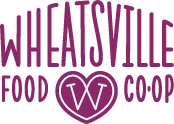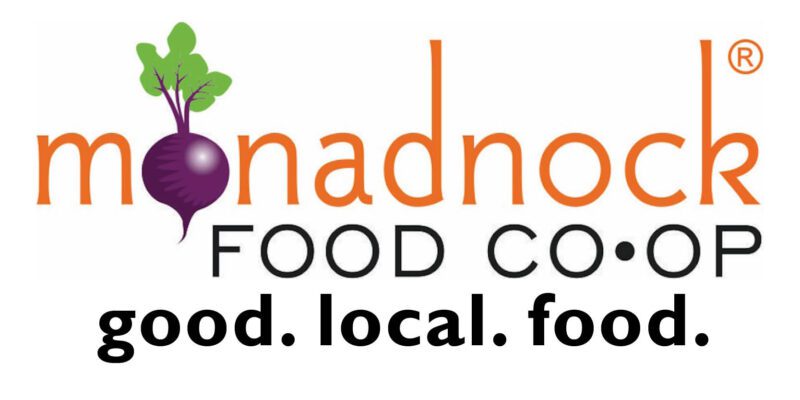Each week when I walk down the aisles in the Monadnock Food Co-op, it is so powerful to remember the first organizing meetings we started back in 2008 to make our store a reality.
Over 100 active volunteers made our co-op a reality since the initial community meetings, surveys, and monthly steering committee meetings that happened for 4 years leading up to our co-op’s opening in early April 2013. Over 1,800 member owners have made our co-op a reality with their $200 investment in membership, and over 150 member owners gave member loans that allowed us to raise just over $1 million of member owner capital to fill the store with food and hire staff.

Our own story is inspiring! Whether it is the behind-the-scenes work of the minute taker at every Board meeting, or the amazing member-owners who have volunteered at hundreds of community events to let people know about the co-op, or the people who made hundreds of phone calls to member owners asking them to consider making a member loan, we are succeeding because each of us is contributing to our co-op’s success.
But the bigger story is the co-op movement we are all a part of. The seven co-operative principles by which all co-ops govern themselves lay the foundation for a powerful business model:
- Voluntary and Open Membership: Anyone can become a member owner of the food co-op and have a voice
- Democratic Member Control: Member Owners elect the board, participate in working committees and give critical feedback to the store management
- Member Economic Participation: If we want it in our community, we will invest in it with our own money
- Autonomy and Independence: Each co-op is an independent entity that reflects the community and members needs in that community – we own it locally
- Education, Training and Information: At the core of the cooperative movement is education around democratic process and and food education (examples – community educational forums to create the co-op, board trainings provided to new board members on how to effectively and professionally manage the co-op and respond to member owners, annual meetings where member owners get updates on how the co-op is doing financially and following through on implementing co-operative values)
- Co-operation among Co-operatives: Many co-ops help other co-ops in the start-up phase but also during their lifetime (ex. Brattleboro and the Putney Co-op really supported and helped the Monadnock Food Co-op in our start-up phase, preparing meals for our volunteer events and sharing organizational documents that helped us with our bylaws, etc…)
- Concern for Community: Each co-op is nested in a different community or region and are uniquely positioned to listen, watch and respond to the needs of member owners and the community at large. An example of how the Monadnock Food Co-op is responding to community need is through the September 24th film and discussion being hosted by the co-op on the new Healthy Food Access Program that makes healthy food more accessible to lower income families and individuals in our region.
These principles unite a much larger group of co-operatives around the country and world.
One great way to connect with the larger national food co-op community is the Consumer Cooperative Management Association (CCMA) Conference which is held annually around the country. The 2013 conference was held in Austin, Texas this year and our board president and I had the opportunity to attend.
Meeting with other board members, General Managers, and staff from food co-ops all over the country helped me see the collective impact co-ops are having as we work toward similar goals in our communities. Nationally, co-ops have played key roles in localizing the food economy, building relationships with farmers and producers, protecting farmland, offering healthy food choices in places where many people didn’t have access before, and investing in education so that people have the information to make healthy food choices for themselves and their families.
Many of our counterparts around the country are doing amazing things with their co-op, and many co-ops have been open for 30-70 years.
 One of co-ops that inspired me at the conference was the Wheatsville Co-op. Not only were they our CCMA host co-op, but they are the only food co-op in Texas. The co-op is nested in Texas’ capital, Austin, a profoundly beautiful city, famous for its music and arts.
One of co-ops that inspired me at the conference was the Wheatsville Co-op. Not only were they our CCMA host co-op, but they are the only food co-op in Texas. The co-op is nested in Texas’ capital, Austin, a profoundly beautiful city, famous for its music and arts.
Ten years ago, Wheatsville Food Co-op was dealing with some big challenges. They had a dysfunctional board, their staff wasn’t very friendly, and their store sales were not doing well. With a couple of visionaries in the co-op and some support from co-op consultants, they were able to create a 10-year vision, “The BIG Direction,” to become the friendliest store in Austin, a city that has more people than the population of Vermont.
Wheatsville management opened its meetings to all staff to increase their knowledge of the store and the management decisions, they changed unfriendly customer policies and updated their staff training for how to deal with challenging customers and how to better communicate between staff. They also created a special bulletin board to honor staff for contributions they were making to improve their workplace culture.
Since their intentional process and implementing some new changes, the Wheatsville Co-op now has a highly functional Board of Directors, a friendly and empowered staff, and their store sales have increased to the point that they are creating a second store to meet the demand.
Their story is so inspiring to me, but the most impressive part of interacting with the Wheatsville Staff at the national conference was how informed, excited, and prideful they were about their co-op. They were clearly empowered and knew how they fit into the success of the co-op. It was great to see how education and empowerment across departments could build team spirit and a successful store.
Another great example of co-operative creativity addressing regional threats on the local food system came from the General Manager of the Sacramento Natural Food Co-op in California. They, as well as neighboring Davis Food Co-op, are working with farmers, other co-ops, land trusts, member owners and community members to make sure that California farmers don’t get priced out of the market for farm land. Within the next 20 years, 70% of our nation’s farmland will change hands.
Both co-ops run a program called, One Farm at a Time, that prioritizes the need to invest in keeping farm lands in production. The two co-ops are also working to promote and financially back a new film by Chuck Schultz, The Last Crop, which is set in California’s Central Valley, and highlights the story of a family’s struggle to ensure their farm’s future after 30 years of working the land. This film tells a personal story about a nationwide challenge, and features how the Sacramento California Co-op is working to help them.
By July of this year, the two co-ops raised over $166,856 from their member owners and community members for the program. These funds will help purchase an agricultural easement that will preserve the family’s farm and ensure that the farm will be affordable for purchase for future generations of farmers once the current farmers retire.
The final part of the conference, that was most inspiring for me, was attending a workshop led by two members of the CDS Consulting Co-op. The workshop highlighted how many people are feeling disempowered in influencing the decisions that impact their lives, and how, as businesses created and owned by their members, co-ops are well structured to create avenues for renewed participation in the very decisions that impact our families and communities. The presenters shared techniques that food co-ops can use to more fully involve their member-owners and community members – creating pathways for input, feedback, voting, and creative programs that really meet the needs of their communities.
So what does this mean for us in the Monadnock Region and our food co-op? How can we work together to build a strong regional economy and a sustainable food system, with good paying jobs, and investing in businesses that responds to community need and member owner feedback?
As a founding member of the Board of Directors of the Monadnock Food Co-op, and a volunteer for years before that, I can see first-hand how our co-op is an expression of us—of our values. Our co-op will only succeed if you, our member-owners, and our community members, get involved! Want some ideas on how to get involved? Serve on the Board of Directors, join or start a MFC Working Group on issues you care about, offer educational programs, partner as a business or individual with initiatives that you care about that you see the co-op supporting, and give us feedback (and roll up your sleeves to help us solve challenges).
We have an awesome model, 7 co-operative principles to guide us, profoundly successful national counterparts who can share resources with us and encourage us in our own growth as a co-operative and you, who care about our regional community, our farms and farmers, healthy food and good jobs.
I look forward to seeing how the Monadnock Food Co-op continues to grow and change over the coming years, and I look forward to working along-side you, my fellow member owners to help our co-op succeed!

